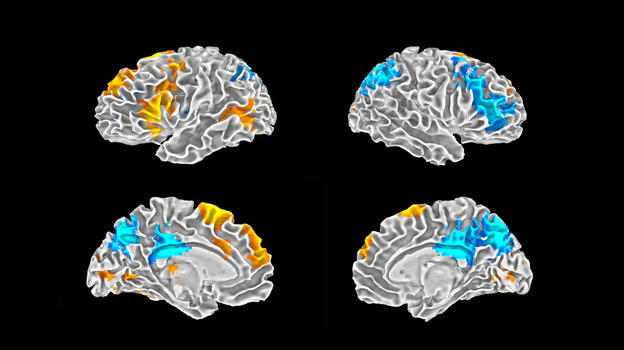
Section Branding
Header Content
Georgia Today: Pres. debate tonight in ATL; Inclusive brain scans; Port of Brunswick biz increases
Primary Content
LISTEN: On the Thursday, June 27 edition of Georgia Today: The presidential debate will be held in Midtown Atlanta tonight; an effort is underway to make brain scans work equally well for Black and white kids; and the port of Brunswick continues to takes on more traffic after the Baltimore bridge collapse.

Peter Biello: Welcome to the Georgia Today podcast from GPB News. Today is Thursday, June 27. I'm Peter Biello. On today's episode, the presidential debate will be held in midtown Atlanta tonight. An effort is underway to make brain scans work equally well for black and white kids, and the Port of Brunswick continues to take on more traffic after the Baltimore Bridge collapse. These stories and more are coming up on this edition of Georgia Today.
Story 1:
Peter Biello: Georgia swing voters and partisans alike turn their eyes to the presidential debate stage in Atlanta tonight. President Joe Biden and former President Donald Trump are scheduled to debate on CNN at 9 p.m. Undecided voter Jake Reynolds of Woodstock, north of Atlanta, says he wants the candidates to talk about the economy.
Jake Reynolds: I'm kind of on the fence only because, obviously, I realize that this is a very, very important election with the direction of our country. There's a lot of things that I think myself, as well as the American people, have question marks about.
Peter Biello: Davante Jennings, chair of the Young Democrats of Georgia Black Caucus, says one of those questions is the candidate's ages.
Davante Jennings: Like, whose brain is deteriorating more than the other's. So I think people are going to be more tuned in and to basically see who's going to make the mistake. And it's going to be one of those things where honestly, like even if somebody stutters over a word, going to blown into this huge thing.
Peter Biello: Jacquelyn Harm, the chair of the Georgia Young Republicans, says this will be the first debate in which both candidates have a presidential record.
Jacquelyn Harm: I think that adds a whole other level to it, because each candidate can then — basically their answer's off of the policy decisions they've had to make, the administrative decisions they've had to make. And there's no candidate appeal here of like, "Oh, well, when I'm elected office," because they both have served.
Peter Biello: GPB's Sarah Kallis is with the president's reporting pool today. She spoke with GPB's Orlando Montoya.
Orlando Montoya: Sarah, tell me about where you are and what people can expect tonight.
Sarah Kallis: I'm at Dobbins Air Force Base right now. I'm with a group of reporters, and we're anxiously awaiting the arrival of President Biden. He's supposed to go to a couple campaign events before eventually going into debate around 9:00 and making a couple stops afterwards, before leaving Atlanta around 1 a.m..
Orlando Montoya: And I know you've been speaking to voters ahead at the debate. What have they been telling you about what they want to hear from the candidates?
Sarah Kallis: Many voters have told me that they are already decided on who they're going to vote for and the debate does not have potential to sway them either way. Still, they're telling me they want to hear the both presidential candidates solutions for economic problems like inflation and the high cost of living.
Peter Biello: That's GPB's Sarah Kallis with the presidential reporting pool. She'll be in the pressroom tonight at CNN Studios in Midtown Atlanta, where we also have reporter Amanda Andrews outside covering potential protests and traffic disruptions as the candidates make their way into town. Heavier than usual traffic is expected, with the debate happening and a Copa America soccer match at Mercedes-Benz Stadium tonight. Several roads will be closed. The Atlanta Police Department says if you plan to be in the city for any reason, plan ahead and expect limited parking and heavier traffic. For soccer fans, MARTA says it is offering additional rail service to Mercedes-Benz Stadium. And of course, tune in for NPR's coverage of the presidential debate tonight at 9 on GPB radio. PBS also will simulcast the CNN debate on your GPB-TV station. Watch or listen at GPB.org.
Story 2:
Peter Biello: A newly opened center is providing support and education for thousands of Georgians living with sickle cell disease. The new Sickle Cell Sanctuary in Southwest Atlanta is aimed at helping people manage the chronic pain that goes along with the disease. GPB's Ellen Eldridge reports.
Ellen Eldridge: Sickle cell is a hereditary red blood cell disease that is often misdiagnosed and leaves patients in pain. Tabatha McGee is the executive director of the Sickle Cell Foundation of Georgia. She says that because pain is internal, doctors often accuse patients of drug seeking.
Tabatha McGee: They are in and out of the hospital, showing up in the emergency room, [in] acute crisis. And when you're in acute crisis, that means that your major organs are depleted of oxygen — kidneys, lung, heart — therefore making it very painful for them.
Ellen Eldridge: The sanctuary specializes in holistic wellness through exercise, massage, stress management and psychotherapy. For GPB News, I'm Ellen Eldridge.
Story 3:
Peter Biello: Georgia's Latino economy is experiencing exceptional growth and now accounts for $34 billion in consumption. Those are two of the key takeaways from a 2024 Latino GDP report, authored by two California researchers for Bank of America and presented at a Latino Economic Forum in Atlanta yesterday. The report found the two top sectors in Georgia's Latino economy to be finance and real estate, and professional and business services.
Story 4:
Peter Biello: Commissioners in Southeast Georgia's Bulloch County have postponed a vote on agreements with neighboring Bryan County over water and sewer services related to the Hyundai electric vehicle plant currently being built in Bryan County. Water demands from the plant and its associated growth have sparked concerns among environmental groups and nearby residents using well water. Commissioners were set to vote on the agreements at a special called meeting this week, after making them public the day before, but they delayed the vote after citizens spoke up, complaining they had not been given enough time to review them.

Story 5:
Peter Biello: Scientists today have a lot of great tools to help them understand how kids' brains develop as they grow. But what happens when these tools weren't built with all kids in mind? GPB's Sofi Gratas has more from Macon, where there are ongoing efforts to address that problem.
Sofi Gratas: At a Mercer University lab, students are watching each other's brains at work.
Grace Gasaway: You have to make sure that it's equidistanced from, like, this point right here.
Sofi Gratas: Grace Gasaway works on fitting a functional near infrared spectroscopy cap — fNIRS, for short — onto another classmate's head. It looks like a swim cap covered in empty spools of thread. Once on, the cap allows Gasaway and her classmates to see a 3D image of Parth Patel's brain.
Grace Gasaway: Do these hurt?
Parth Patel: No, those don't hurt.
Sofi Gratas: Each empty spool is actually a detector measuring brain activity through an infrared light signal. The signals are read on a computer.
Grace Gasaway: The green indicates that the signal is good and the red indicates, obviously, the signal is bad.
Sofi Gratas: But there's a problem. Patel's hair is really dark and really thick.
Grace Gasaway: I would check these seven in the back here.
Sofi Gratas: On the screen, there's lots of red and yellow, indicating a poor connection with his scalp.
Grace Gasaway: Obviously it's not a good detector because there's all this hair in the way. And this is what takes a while.
Sofi Gratas: It takes moving that hair one detector at a time to get a good connection. While these kids are in college, fNIRS is optimized to study brain activity in younger subjects, says neuroscientist Anastasia Kerr-German, who runs the research happening here.
Anastasia Kerr-German: We can't stick a kid in an fMRI scanner in a wakeful state until they're a healthy 6 or 7 years old, because they won't sit for it.
Sofi Gratas: But by that time, researchers may have missed a crucial window for understanding how things like ADHD and autism develop. fNIRS has helped reach those younger kids, but Kerr-German says:
Anastasia Kerr-German: Now we've found that you can't use it with any little kid that has any kind of hairstyle outside of flat, straight hair.
Sofi Gratas: The hair most white kids have. This is why this cutting-edge research has so far largely left out Black and brown kids. That could reinforce prejudices in children's mental health. For example, white boys are more likely than others to be diagnosed with ADHD. A diagnosis can lead to support. Meanwhile, Black boys more often get labeled with behavioral issues for which they may be punished. German wants to see these trends change, so she's creating a more inclusive type of fNIRS cap.
Anastasia Kerr-German: The lowest-hanging fruit, in our opinion, is to address the disparities, based on race in this technology. We're going to actually do this down lower...
Sofi Gratas: For now, the prototype involves flexible plastic used to weave fNIRs detectors onto a participant's head. It's affordable to recreate, and Kerr-German hopes this model gets approved for use across the country.
Anastasia Kerr-German: Let her hair rest on top.
Sofi Gratas: But student Alexandria Shells, also working in the lab, says it will take more than just fixing the tech. Shells is Black and recognizes mistrust runs deep.
Alexandria Shells: We're very protective, I think — as we should be; a lot of harm has been done to our community, especially coming from research institutions. And so I think our biggest goal with this project is, like, helping build trust.
Sofi Gratas: At the Child Development Center at Central Georgia Technical College, Kerr-German has been welcomed to start building that trust. She moves around a classroom of preschoolers.
Anastasia Kerr-German: That's one popsicle and two popsicles.
Sofi Gratas: Playing with them.
Anastasia Kerr-German: That's right, three popsicles! Good job!
Sofi Gratas: But also watching for any signs that a kid may need extra support. She'll share what she sees with parents in the hopes that information can help a child succeed.
Anastasia Kerr-German: We also, hopefully will be building bridges to where these communities want to then come be a part of research.
Sofi Gratas: It's a first step, she says. But a big one. For GPB News, I'm Sofi Gratas.

Story 6:
Peter Biello: The Port of Brunswick handled an all-time high of about 86,000 units of roll-on roll-off cargo last month, the Georgia Ports Authority said earlier this week it had a 26% increase over May of last year. Much of the increased port traffic was related to the bridge collapse in Baltimore, which shut down that port for 11 weeks. But other factors were involved as well.
Story 7:
Peter Biello: A nonprofit organization dedicated to land conservation has acquired two parcels of land in Middle Georgia that will support efforts to establish the Ocmulgee Mounds as Georgia's first national park. The Branson Tracts occupy 931 acres in Bibb and Twiggs counties. The Open Space Institute has acquired the properties from conservation-minded landowner Martha Bond Branson, with plans to transfer them to the U.S. Fish and Wildlife Service as additions to the 8,600-acre Bond Swamp National Wildlife Refuge. The Branson properties were saved with help from the Knoblock Family Foundation, the Green South Foundation and the Peyton Anderson Foundation.

Story 8:
Peter Biello: Elton John is auctioning off more of his personal items that once filled his previous home on Peachtree Road in Atlanta. Online seller eBay said today that hundreds of items from the singer's legendary wardrobe will be sold on the platform for 10 days, with all proceeds supporting the Elton John AIDS Foundation. An eclectic mix of items from a series of similar sales at Christie's auction house in February fetched $20 million.
Story 9:
Peter Biello: In sports, the Atlanta Hawks had the No. 1 overall pick in the NBA draft last night. 19-year-old Zaccharie Risacher from France is expected to be a foundational player for the Hawks, and it was a good night for basketball fans from France. France and the U.S. are the only countries with three players selected within the top 10 picks of an NBA draft. In baseball, the Braves split a doubleheader against the Saint Louis Cardinals yesterday, winning the first but losing the second. Reynaldo Lopez presided over the win, allowing two runs and four hits in five innings, and Bryce Elder was the losing pitcher in the second game, allowing two runs and five hits in six innings. The Braves play the White Sox today in a makeup game of a weather cancellation back in April. Chris Sale is expected to get the start.
Peter Biello: And that is it for this edition of Georgia Today. If you want to learn more about any of these stories, visit GPB.org/news. And if you haven't subscribed to this podcast yet, do it now. It'll keep us current in your podcast feed, and if you've got feedback, we would love to hear from you by email. The address is GeorgiaToday@GPB.org. I'm Peter Biello. Thank you for listening. We'll see you tomorrow.
---
For more on these stories and more, go to GPB.org/news



